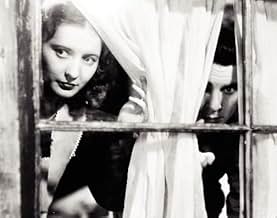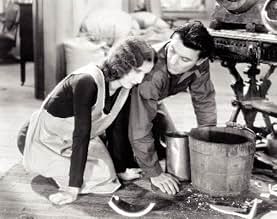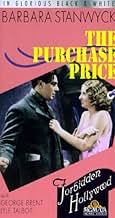AVALIAÇÃO DA IMDb
6,4/10
2 mil
SUA AVALIAÇÃO
Adicionar um enredo no seu idiomaA torch singer becomes a farmer's mail-order bride.A torch singer becomes a farmer's mail-order bride.A torch singer becomes a farmer's mail-order bride.
- Direção
- Roteiristas
- Artistas
Mae Busch
- Queenie - Girl on Train
- (não creditado)
Nick Copeland
- Skins' Pal at Shivaree
- (não creditado)
Mike Donlin
- Tom Buchanan - Man at Shivaree
- (não creditado)
Harrison Greene
- Man in Hotel Lobby
- (não creditado)
Crauford Kent
- A.C. Peters - The Banker
- (não creditado)
Matt McHugh
- Waco - Fields' Henchman
- (não creditado)
John 'Skins' Miller
- Skins - The Accordion Player
- (não creditado)
Carlyle Moore Jr.
- Hotel Desk Clerk
- (não creditado)
Edmund Mortimer
- Dance Extra
- (não creditado)
William H. O'Brien
- Waiter in Opening Nightclub Scene
- (não creditado)
Henry Otho
- Extra in Beer Hall and at Shivaree
- (não creditado)
- Direção
- Roteiristas
- Elenco e equipe completos
- Produção, bilheteria e muito mais no IMDbPro
Avaliações em destaque
The appeal of this somewhat run-of-the-mill film is Barbara Stanwyck in an early display of her mega-watt star power and her ability to turn mediocre material into something special.
Her character doesn't make much sense: a nightclub singer from the city who wants to get away from the bootlegger boyfriend hounding her and so agrees to an arranged marriage with a farmer up in the wilds of North Dakota! The bootlegger (played by Lyle Talbot) isn't threatening or abusive, so one wonders why Stanwyck needs to go to such great lengths to avoid him -- keep wondering, because the movie never explains it. But if you can swallow that, then you can easily swallow the fact that this urban good-time gal seems to know all about how to run a farm.
Which brings me back to Stanwyck. The movie's premise isn't remotely plausible, but Stanwyck somehow makes it so through the confidence of her performance. I really think she could make anything worth sitting through just for the pleasure of watching her.
The film does provide an interesting look at what farm life in the early days of the 1930s was like, a lifestyle I've only seen recreated in more modern-day movies.
Grade: B-
Her character doesn't make much sense: a nightclub singer from the city who wants to get away from the bootlegger boyfriend hounding her and so agrees to an arranged marriage with a farmer up in the wilds of North Dakota! The bootlegger (played by Lyle Talbot) isn't threatening or abusive, so one wonders why Stanwyck needs to go to such great lengths to avoid him -- keep wondering, because the movie never explains it. But if you can swallow that, then you can easily swallow the fact that this urban good-time gal seems to know all about how to run a farm.
Which brings me back to Stanwyck. The movie's premise isn't remotely plausible, but Stanwyck somehow makes it so through the confidence of her performance. I really think she could make anything worth sitting through just for the pleasure of watching her.
The film does provide an interesting look at what farm life in the early days of the 1930s was like, a lifestyle I've only seen recreated in more modern-day movies.
Grade: B-
BARBARA STANWYCK is a city gal fed up with the sophisticated life of a nightclub singer and her lecherous boyfriend (LYLE TALBOT) and who sees an "escape" by fleeing to the country for a more bucolic existence and more wholesome environment. She gets more than she bargains for when her mail order husband turns out to be shy farmer (GEORGE BRENT), whom she at first repulses when he comes on too strong with his lovemaking and then spends the rest of the film trying to make it up to him.
The unusual domestic drama gives both Stanwyck and Brent offbeat roles which they handle beautifully. Brent is a surprising revelation as the shy, bumbling country guy with no understanding of Stanwyck's softer feelings and holding off loving her until the final reel, after the two of them have to save their crop of wheat from burning to the ground.
Only weak point in the story is the overdone nature of the wild party scene shortly after their wedding and Stanwyck's reaction to the crudeness of the country bumpkins. It seems a bit of a stretch to believe the way this scene unfolds.
But otherwise, an interesting look at Stanwyck who excels in showing both sides of her character--tough and tender--and Brent, who is usually the more debonair, sophisticated man showing us another side of his personality (and with some nice touches of humor too) as the shy groom. They both get excellent support from LYLE TALBOT as "the other man" in a rather thankless role that he makes believable.
Well worth watching and nicely directed by William Wellman.
The unusual domestic drama gives both Stanwyck and Brent offbeat roles which they handle beautifully. Brent is a surprising revelation as the shy, bumbling country guy with no understanding of Stanwyck's softer feelings and holding off loving her until the final reel, after the two of them have to save their crop of wheat from burning to the ground.
Only weak point in the story is the overdone nature of the wild party scene shortly after their wedding and Stanwyck's reaction to the crudeness of the country bumpkins. It seems a bit of a stretch to believe the way this scene unfolds.
But otherwise, an interesting look at Stanwyck who excels in showing both sides of her character--tough and tender--and Brent, who is usually the more debonair, sophisticated man showing us another side of his personality (and with some nice touches of humor too) as the shy groom. They both get excellent support from LYLE TALBOT as "the other man" in a rather thankless role that he makes believable.
Well worth watching and nicely directed by William Wellman.
This is sold as "pre-Code," as if there will something risqué or shocking, but certainly by today's standards -- or lack thereof -- and even by those of the era, there is nothing to bother your grandma or even your (reasonable) preacher.
There is something, though, to excite the movie-lover: Barbara Stanwyck's performance.
Apparently in real life she was a pretty tough cookie, and certainly she played some hard women in many of her films.
In "The Purchase Price" her character refers to herself as having maintained some sort of a reputation and in fact she comes across as a very nice, even admirable person.
She certainly looked good, with a gentle strength, or strong gentleness, poking out of the chorus girl/mistress persona.
The story, though, never does make much sense, and why the people did what they did, except for the character played by Lyle Talbot -- in a great role for him, and excellently played -- is not clear.
One more glaring error: North (brrrr) Dakota doesn't have any hills, and the shots of snow-capped peaks showed that wherever this film was shot, it sure wasn't North (brrrr) Dakota, you betcha.
One scene of plowing showed the genuine agoraphobic look of that state, where neither hills nor even trees are native. Except for cottonwoods along the creeks and rivers, what trees there are in North (brrrr) Dakota have had to be brought in from the real world.
Plus North (brrrrr) Dakota drunks and brawlers are not Irish and Scots, as this movie implies, but Poles and Czechs and Germans, sometimes even Norwegians, unless they are Lutherans then, of course, they don't drink or brawl. And if you don't believe me, ask their preachers.
Anyway, watch this for Stanwyck and suspend your disbelief about all the rest. She is worth spending your time.
There is something, though, to excite the movie-lover: Barbara Stanwyck's performance.
Apparently in real life she was a pretty tough cookie, and certainly she played some hard women in many of her films.
In "The Purchase Price" her character refers to herself as having maintained some sort of a reputation and in fact she comes across as a very nice, even admirable person.
She certainly looked good, with a gentle strength, or strong gentleness, poking out of the chorus girl/mistress persona.
The story, though, never does make much sense, and why the people did what they did, except for the character played by Lyle Talbot -- in a great role for him, and excellently played -- is not clear.
One more glaring error: North (brrrr) Dakota doesn't have any hills, and the shots of snow-capped peaks showed that wherever this film was shot, it sure wasn't North (brrrr) Dakota, you betcha.
One scene of plowing showed the genuine agoraphobic look of that state, where neither hills nor even trees are native. Except for cottonwoods along the creeks and rivers, what trees there are in North (brrrr) Dakota have had to be brought in from the real world.
Plus North (brrrrr) Dakota drunks and brawlers are not Irish and Scots, as this movie implies, but Poles and Czechs and Germans, sometimes even Norwegians, unless they are Lutherans then, of course, they don't drink or brawl. And if you don't believe me, ask their preachers.
Anyway, watch this for Stanwyck and suspend your disbelief about all the rest. She is worth spending your time.
Of course this delicious tour-de-force is totally incredible... but WOW! You can't take your eyes off the screen in case Wellman gives his heroine whiplash as she moves from plushly-kept woman in Manhattan to mail-order farmer's bride in North Dakota. From take-out at Tiffany's to hauling coal nuggets 20 miles through a blizzard. From igniting the lust in men with her daring chanteusing to putting out the fire villains set to her and hubby George Brent's last-hope crop of wheat. All in just over 60 minutes!
This film deals with Stanwyck, who works as a singer in New York. She has been working the nightclub circuit since she was a teenager and is romantically involved with the leader of the underground crime world. Fixture of the pre-code world, Lyle Talbot, portrays the underground kingpin. Because breaking up with such a powerful man, like Talbot, may prove to be difficult, Stanwyck opts to escape to Montreal. In Montreal, she resumes her career under a new name. Stanwyck is spotted by one of Talbot's henchmen. In lieu of returning to Talbot, Stanwyck hatches a scheme with the maid at her apartment building. It seems that the maid has been corresponding with a North Dakota farmer, George Brent, who is looking for a mail order bride. In one of her letters, the maid mails Stanwyck's picture instead of her own, because she finds the youthful Stanwyck more attractive than herself. Sensing the perfect plan, Stanwyck offers to pay the maid two month's worth of wages if she can go to North Dakota in her place. The maid agrees.
Stanwyck and Brent marry and soon it's Stanwyck's turn to learn about life on a farm during the Great Depression. On their wedding night, Brent tries to make advances on new wife Stanwyck to consummate their relationship, but she turns him down and forces him to sleep elsewhere. I know they're married and all, but I don't blame her, she literally just met and married him that same day. I imagine however, that sex probably comes with the territory as a mail order bride. But I digress.
For most of the film, Brent is aloof to Stanwyck and keeps his distance. She genuinely begins to embrace life on the farm and learns how to sew, cook, clean, etc. She is friendly with the neighbors and even helps a neighbor who has recently given birth. Stanwyck helps out with the baby and even instructs a young Anne Shirley how she can help her mother who is recuperating from the birth.
The main conflict in the film, aside from Brent's unhappiness with Stanwyck, is that he is broke and will lose his farm if he cannot pay his back bills. His saving grace however is that he owns a strain of wheat that grows well and is of high quality. He's sure to sell his wheat if he grows and harvests it. Brent and Stanwyck are finally on the same page and work together to save the farm.
This was an okay film, definitely not among one of Stanwyck's best. It definitely doesn't rank up there with my favorite Stanwyck pre-code, Ladies They Talk About. She gives the part her all, even though the plot is somewhat absurd. Brent is just there. He doesn't do much except give Stanwyck the silent treatment. But then this strong silent type was probably Brent's interpretation of a farmer of Scandinavian ancestry living on the Great Plains.
There were definitely some pre-code elements in the film, like Stanwyck walking around the bedroom clad in only a short slip and knee high stockings. She also lays a negligee out on the bed for George Brent to see and get excited, but he's mad at Stanwyck, and won't take the bait.
Stanwyck and Brent marry and soon it's Stanwyck's turn to learn about life on a farm during the Great Depression. On their wedding night, Brent tries to make advances on new wife Stanwyck to consummate their relationship, but she turns him down and forces him to sleep elsewhere. I know they're married and all, but I don't blame her, she literally just met and married him that same day. I imagine however, that sex probably comes with the territory as a mail order bride. But I digress.
For most of the film, Brent is aloof to Stanwyck and keeps his distance. She genuinely begins to embrace life on the farm and learns how to sew, cook, clean, etc. She is friendly with the neighbors and even helps a neighbor who has recently given birth. Stanwyck helps out with the baby and even instructs a young Anne Shirley how she can help her mother who is recuperating from the birth.
The main conflict in the film, aside from Brent's unhappiness with Stanwyck, is that he is broke and will lose his farm if he cannot pay his back bills. His saving grace however is that he owns a strain of wheat that grows well and is of high quality. He's sure to sell his wheat if he grows and harvests it. Brent and Stanwyck are finally on the same page and work together to save the farm.
This was an okay film, definitely not among one of Stanwyck's best. It definitely doesn't rank up there with my favorite Stanwyck pre-code, Ladies They Talk About. She gives the part her all, even though the plot is somewhat absurd. Brent is just there. He doesn't do much except give Stanwyck the silent treatment. But then this strong silent type was probably Brent's interpretation of a farmer of Scandinavian ancestry living on the Great Plains.
There were definitely some pre-code elements in the film, like Stanwyck walking around the bedroom clad in only a short slip and knee high stockings. She also lays a negligee out on the bed for George Brent to see and get excited, but he's mad at Stanwyck, and won't take the bait.
Você sabia?
- CuriosidadesDuring the wheat-burning scene a stand-in was used instead of Barbara Stanwyck, but she didn't think the stand-in acted as the character so Stanwyck decided to play it herself. This resulted in her getting some burns on her legs, but she never complained.
- Erros de gravaçãoWhen Barbara Stanwyck gets off the train in North Dakota the terrain is very mountainous. North Dakota is on the Great Plains - very flat.
- Citações
Eddie 'Ed' Fields: Ya daffy little tahmata, I'm bugs about ya. I'd marry ya myself, if I wasn't already married.
- ConexõesFeatured in Barbara Stanwyck: Fire and Desire (1991)
- Trilhas sonorasTake Me Away
(1932) (uncredited)
Music by Peter Tinturin
Lyrics by Sidney Clare and Charles Tobias
Played during the opening credits and at the end
Sung by Barbara Stanwyck at the nightclub
Played as background music often
Principais escolhas
Faça login para avaliar e ver a lista de recomendações personalizadas
- How long is The Purchase Price?Fornecido pela Alexa
Detalhes
- Data de lançamento
- País de origem
- Idioma
- Também conhecido como
- The Purchase Price
- Locações de filme
- Empresa de produção
- Consulte mais créditos da empresa na IMDbPro
Bilheteria
- Orçamento
- US$ 202.000 (estimativa)
- Tempo de duração
- 1 h 8 min(68 min)
- Cor
- Mixagem de som
- Proporção
- 1.37 : 1
Contribua para esta página
Sugerir uma alteração ou adicionar conteúdo ausente





































